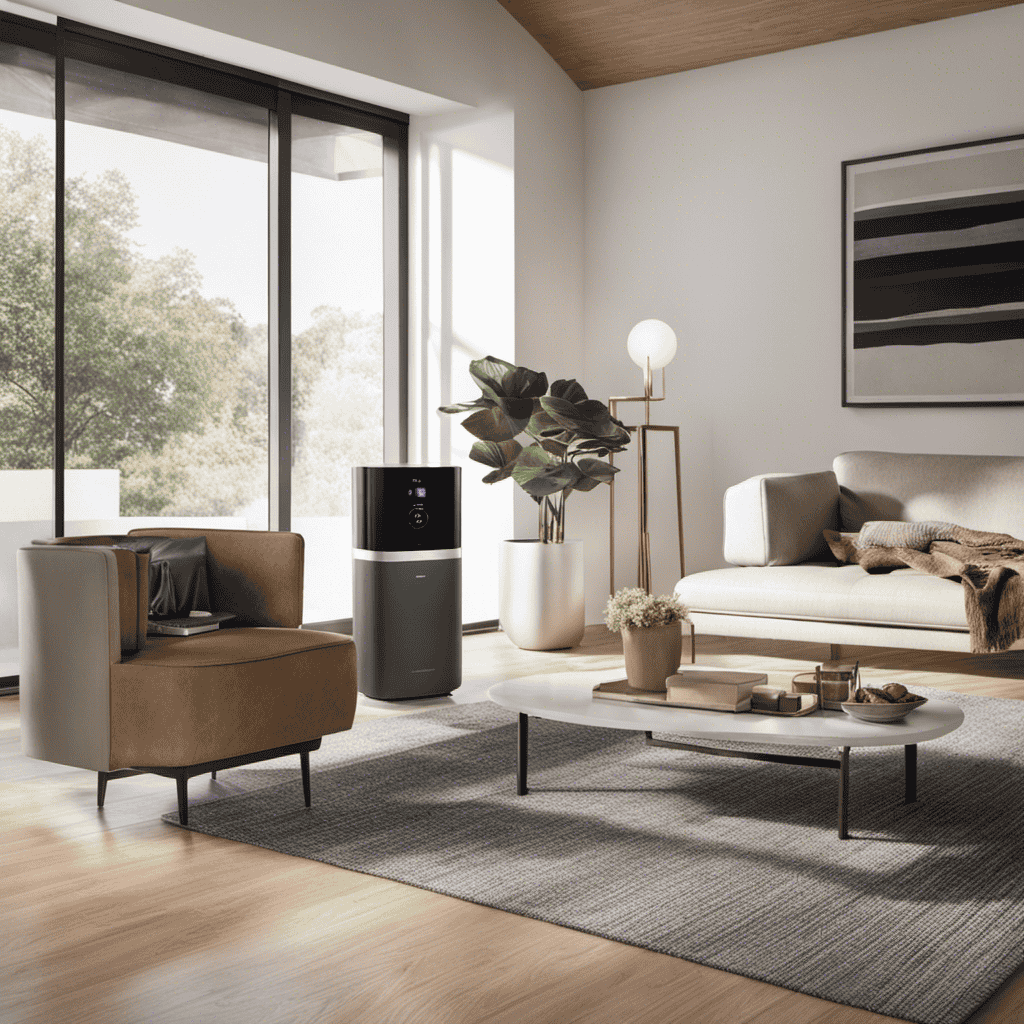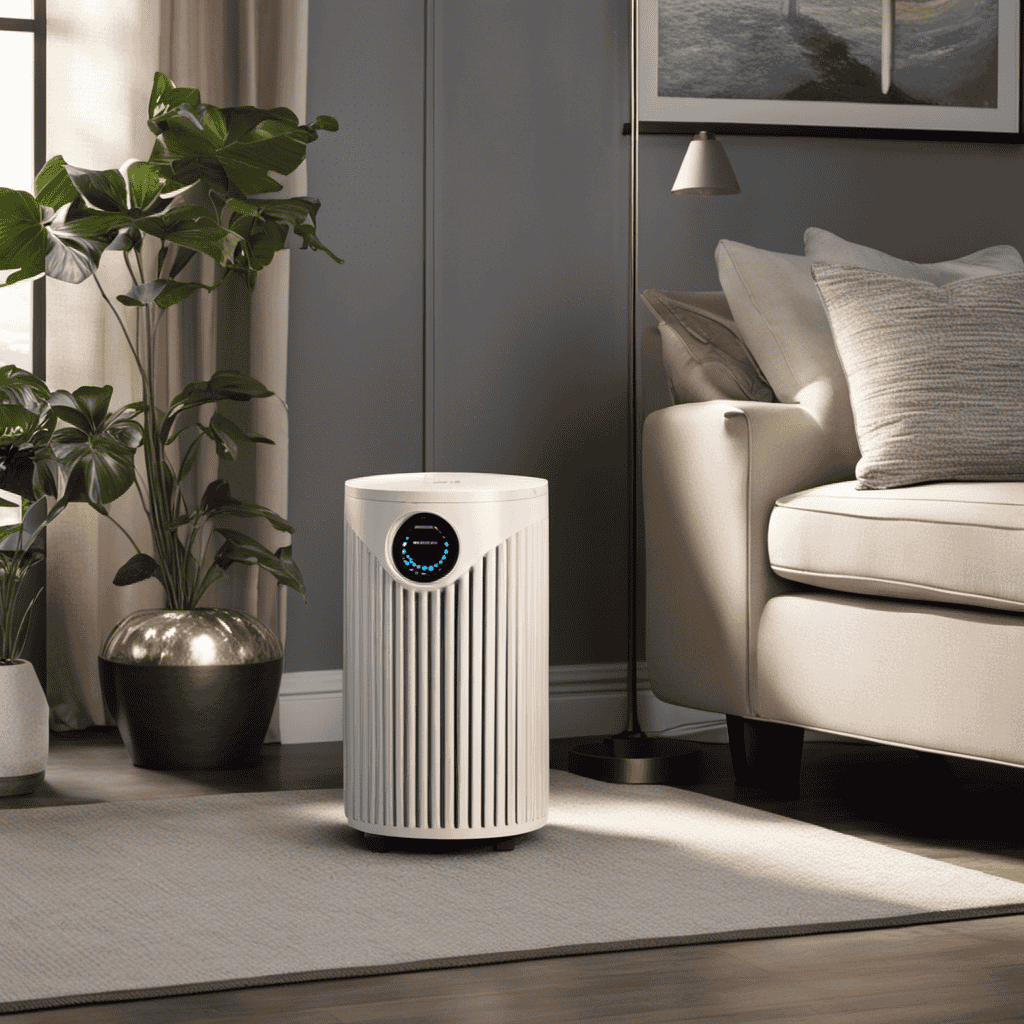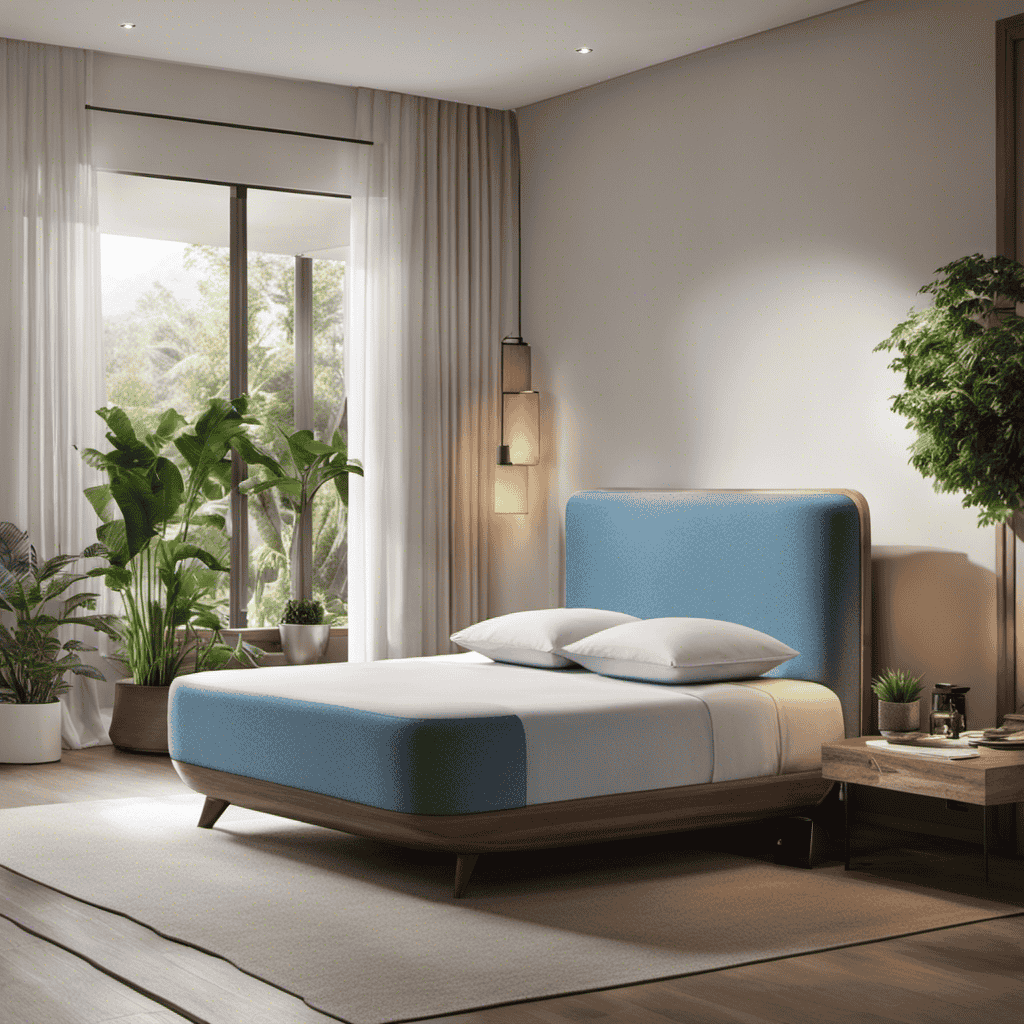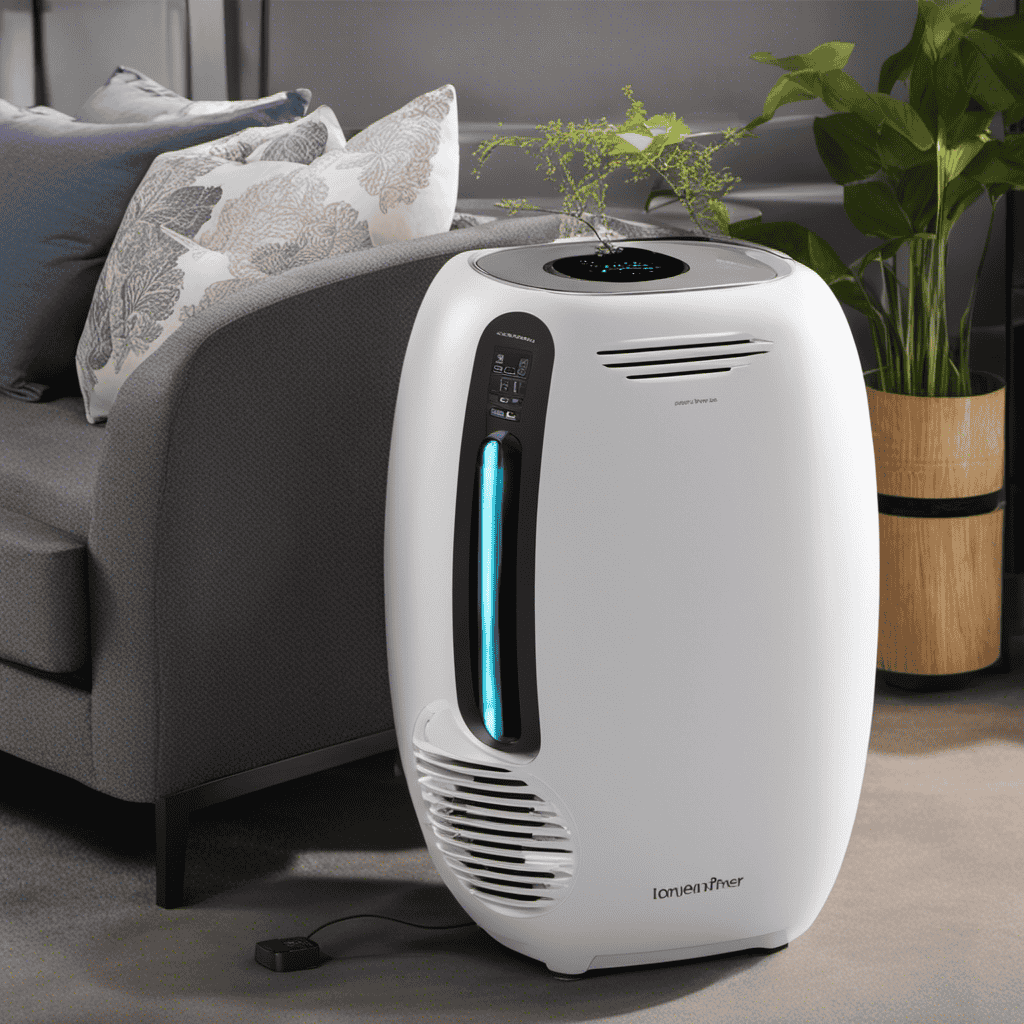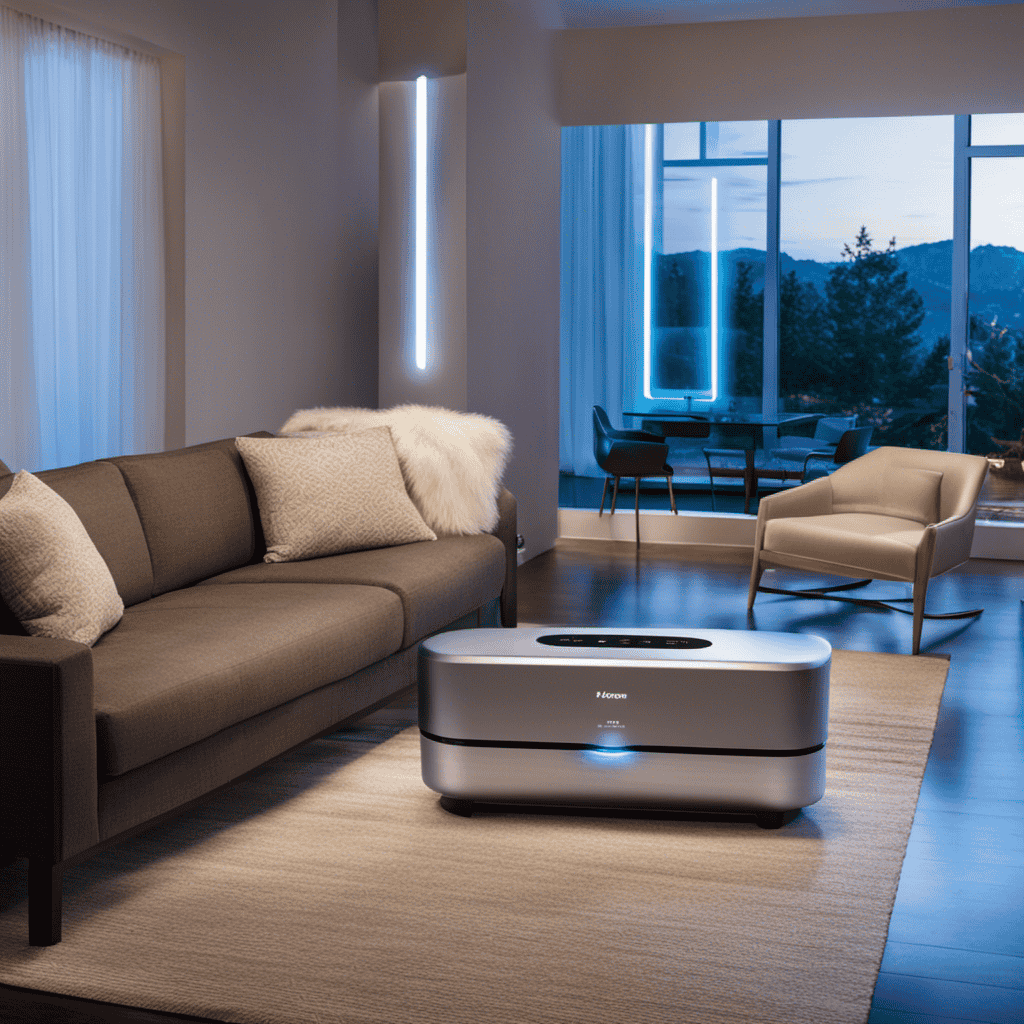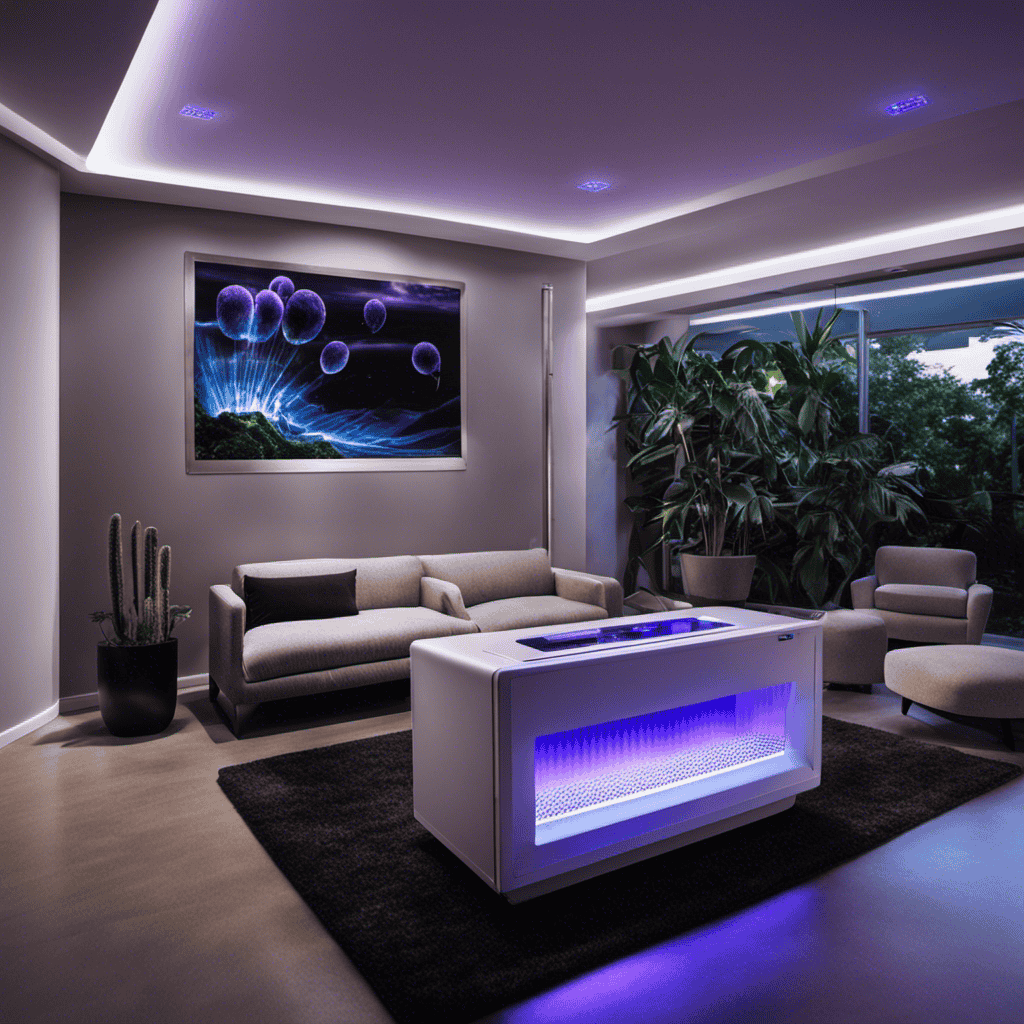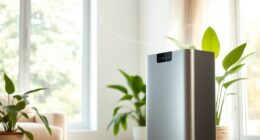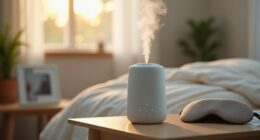As a specialist in the field of indoor air cleanliness, it never crossed my mind that a basic appliance such as an air cleaner could capture my interest so thoroughly. However, I must share that after coming across the effectiveness of a Hepa Air Purifier, I was utterly astonished.
It’s incredible how this compact machine can filter out 99.97% of airborne particles, leaving your space clean and fresh.
In this article, I’ll explain how these purifiers work, the benefits they offer, and how to choose the right one for your needs. Trust me, you’ll want to stick around for this!
Key Takeaways
- HEPA air purifiers filter out particles as small as 0.3 microns, capturing allergens, dust, and pet dander.
- HEPA filters have a dense fiber structure that traps airborne particles and forces them to adhere to the fibers.
- Using a HEPA air purifier improves overall air quality by removing airborne contaminants and reducing the presence of allergens in the air.
- HEPA air purifiers are effective in capturing dust, pollen, pet dander, mold spores, bacteria, and viruses, creating a healthier indoor environment for better respiratory health.
How Does a Hepa Air Purifier Work
To understand how a HEPA air purifier works, you need to know that it filters out particles as small as 0.3 microns. HEPA, which stands for High-Efficiency Particulate Air, is a filtration technology that is widely used in air purifiers.
The key to its effectiveness lies in its dense fiber structure, which traps airborne particles and prevents them from circulating back into the room. When air passes through the HEPA filter, it forces the particles to adhere to the fibers, effectively removing them from the air.
This makes HEPA air purifiers highly efficient at capturing allergens, dust, pet dander, and other pollutants. When choosing the right HEPA air purifier, consider the size of the room, the CADR rating, and the noise level to ensure optimal performance.
Understanding HEPA filtration technology is essential for creating a clean and healthy indoor environment.
Benefits of Using a Hepa Air Purifier
Using a Hepa air purifier can provide several benefits for indoor air quality.
First, it can help improve the overall air quality by effectively capturing and removing airborne contaminants such as dust, pollen, and pet dander.
This can be especially beneficial for individuals with allergies or asthma, as it can provide relief by reducing the presence of these allergens in the air.
Additionally, a Hepa air purifier can also help reduce the spread of airborne contaminants, making it a valuable tool for maintaining a clean and healthy indoor environment.
Improved Indoor Air Quality
Take a look at how an HEPA air purifier can help you breathe cleaner air indoors. Indoor air pollution is a serious issue that can affect our health and well-being. Thankfully, there are effective air purification methods available, such as HEPA filtration. HEPA stands for High Efficiency Particulate Air, and HEPA air purifiers are designed to remove 99.97% of airborne particles as small as 0.3 microns. This includes dust, pollen, pet dander, mold spores, and even some bacteria and viruses. The table below highlights the key features of an HEPA air purifier:
| Benefits of HEPA Air Purifier |
|---|
| Removes airborne particles |
| Reduces allergens |
| Improves indoor air quality |
| Helps alleviate asthma and allergies |
Allergy and Asthma Relief
HEPA air purifiers can provide relief for allergies and asthma by removing airborne particles that trigger respiratory issues. As someone who suffers from allergies, I understand the importance of allergy prevention and maintaining respiratory health.
HEPA, or High-Efficiency Particulate Air, filters are designed to capture 99.97% of particles as small as 0.3 microns. These include common allergens like pollen, dust mites, pet dander, and mold spores. By effectively removing these irritants from the air, HEPA air purifiers can significantly reduce allergy symptoms and asthma attacks.
This is especially beneficial for individuals with respiratory conditions, as cleaner air helps to improve breathing and overall lung function. Investing in a HEPA air purifier is an excellent way to create a healthy indoor environment and find relief from allergies and asthma.
Reduction in Airborne Contaminants
By removing airborne particles, such as pollen and dust, an air purifier can significantly reduce the amount of contaminants in the air. Airborne particles can pose a major threat to indoor air quality, leading to various health issues. Air filtration is essential in providing clean and fresh air in our living spaces. An air purifier works by drawing in the surrounding air and passing it through a series of filters. These filters are designed to capture and trap airborne particles, preventing them from circulating back into the room. The most effective type of filter for removing airborne contaminants is the High Efficiency Particulate Air (HEPA) filter. This type of filter can capture particles as small as 0.3 microns with an efficiency of 99.97%. With an HEPA air purifier, you can breathe easier knowing that the air you are inhaling is free from harmful pollutants and allergens.
| Benefits of an Air Purifier |
|---|
| Removes Airborne Pollutants |
| Improves Indoor Air Quality |
| Reduces Allergy Symptoms |
| Prevents Asthma Attacks |
| Promotes Better Respiratory Health |
Considering the importance of air filtration in maintaining a healthy living environment, it is crucial to choose the right HEPA air purifier for your needs.
Factors to Consider When Choosing a Hepa Air Purifier
When choosing a HEPA air purifier, it’s important to consider factors such as room size and filter replacement frequency. These factors greatly affect the performance of the air purifier and ensure that it effectively removes airborne contaminants from your environment.
Here are three key factors to consider when making your decision:
-
Room Size: The size of the room you want to purify plays a crucial role in determining the appropriate air purifier. A purifier that is too small for the room will not be able to effectively clean the air, while a purifier that is too large may consume unnecessary energy.
-
Filter Replacement Frequency: HEPA filters need regular replacement to maintain their efficiency. Consider the cost and availability of replacement filters when choosing an air purifier. Some models offer filters that can be cleaned and reused, which can be more cost-effective in the long run.
-
Performance Comparison: Look for air purifiers that have a high Clean Air Delivery Rate (CADR) and a high percentage of particles removed per pass. These performance indicators help you evaluate the effectiveness of the air purifier in capturing and removing contaminants from the air.
Common Misconceptions About Hepa Air Purifiers
When it comes to hepa air purifiers, there are several common misconceptions that need to be debunked.
One prevalent myth is that hepa air purifiers can eliminate all types of pollutants. While hepa filters are highly effective at capturing particles as small as 0.3 microns, they may not be as efficient in removing gases, odors, and volatile organic compounds (VOCs).
Another misconception is that hepa air purifiers can cure allergies. While they can certainly help alleviate allergy symptoms by reducing airborne allergens, they cannot completely eliminate allergies or cure them.
Additionally, some people believe that hepa air purifiers require regular filter replacements. While filter replacements are necessary, the frequency depends on the specific model and usage.
It is important to understand these common misconceptions to make informed decisions when choosing a hepa air purifier.
Maintaining and Cleaning Your Hepa Air Purifier
Regular maintenance and cleaning is essential for keeping your HEPA air purifier running efficiently. Here are three important steps to ensure optimal performance and longevity of your device:
-
Replace filters regularly: HEPA filters trap microscopic particles, but over time, they become clogged and less effective. Check the manufacturer’s recommendations for filter replacement intervals and follow them diligently.
-
Clean the exterior: Dust and debris can accumulate on the surface of your air purifier, hindering its airflow and reducing its efficiency. Use a soft cloth or brush to gently wipe away any dirt or grime.
-
Keep the air intake clear: Ensure that the air intake vents are free from obstructions such as furniture, curtains, or other objects. This allows the purifier to draw in air effectively and maximize its cleaning capabilities.
By properly maintaining and cleaning your HEPA air purifier, you can ensure that it functions at its best, providing you with cleaner and healthier air.
Now, let’s explore whether HEPA air purifiers are worth the investment.
Are Hepa Air Purifiers Worth the Investment?
If you’re wondering whether investing in a HEPA air purifier is worth it, there are several factors to consider. One of the main considerations is the effectiveness of HEPA air purifiers in improving indoor air quality. HEPA filters are designed to capture 99.97% of particles as small as 0.3 microns, including allergens, dust, and pet dander. This high level of filtration makes HEPA air purifiers highly effective in removing airborne pollutants and improving overall air quality.
Another factor to consider is the cost of HEPA air purifiers. While the initial investment may be higher compared to other types of air purifiers, the long-term benefits outweigh the cost. HEPA filters have a longer lifespan and require less frequent replacement compared to other filters. Additionally, the improved air quality can help prevent respiratory issues and allergies, reducing healthcare costs in the long run. In conclusion, investing in a HEPA air purifier is worth it for those looking to improve indoor air quality and promote better health.
| PROS | CONS |
|---|---|
| Highly effective in removing airborne pollutants | Initial cost may be higher |
| Long filter lifespan and less frequent replacement | May require regular maintenance |
| Improves air quality and reduces respiratory issues | May produce noise while operating |
| Helps prevent allergies and promotes better health | May consume more energy |
| Provides long-term benefits and cost savings |
Frequently Asked Questions
How Long Does a HEPA Air Purifier Last Before Needing to Be Replaced?
An air purifier’s lifespan can vary, but on average, a HEPA filter lasts around 6 to 12 months before needing replacement. Signs of a worn-out filter include reduced airflow and decreased air purification efficiency.
Can a HEPA Air Purifier Eliminate All Types of Odors?
Yes, a HEPA air purifier can eliminate smoke odors and remove cooking odors. It’s like having a superhero that fights against the invisible villains in the air, leaving your space fresh and clean.
Are There Any Health Risks Associated With Using a HEPA Air Purifier?
There are no health risks associated with using a HEPA air purifier. In fact, it offers numerous health benefits by removing harmful particles from the air. Regular maintenance, such as replacing filters, ensures optimal performance.
Can a HEPA Air Purifier Remove Pet Dander and Allergens From the Air?
Yes, a Hepa air purifier can effectively remove pet dander and allergens from the air. It is especially beneficial for pet owners as it reduces indoor pollutants and improves air quality.
Are There Any Specific Brands or Models of HEPA Air Purifiers That Are Considered the Best in Terms of Performance and Reliability?
There are several top-rated brands and models of HEPA air purifiers that excel in terms of performance and reliability. To find the best one, I suggest reading HEPA air purifier reviews and considering factors like maintenance requirements.
What Are the Benefits of Using a HEPA Air Purifier Over Other Types of Air Purifiers?
When considering the air purifier versus HEPA filter difference, the main benefit of using a HEPA air purifier is its superior ability to capture particles as small as 0.3 microns. Unlike other air purifiers, HEPA filters can remove up to 99.97% of airborne contaminants, making them exceptionally effective for improving indoor air quality.
Conclusion
In conclusion, after carefully considering the facts and benefits, I’m convinced that investing in a Hepa air purifier is definitely worth it.
It acts as a shield against airborne particles, just like a knight protecting a kingdom from invaders.
Its efficient filtration system ensures clean and fresh air, reducing the risk of allergies and respiratory problems.
By choosing the right model and maintaining it properly, you can enjoy the benefits of clean air for years to come.
Don’t underestimate the power of a Hepa air purifier to safeguard your health and well-being.
